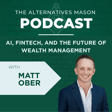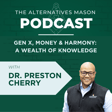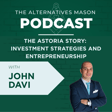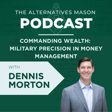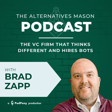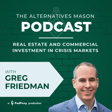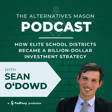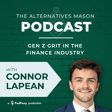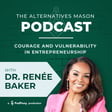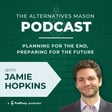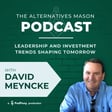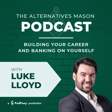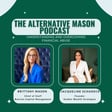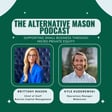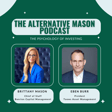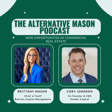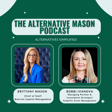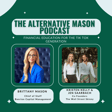Become a Creator today!Start creating today - Share your story with the world!
Start for free
00:00:00
00:00:01

The Alternatives Mason: Building Alts Knowledge Brick by Brick | Episode 24 | Rocky, the Underdogs, and Global Macro Trading with Neil Azous
This episode features Neil Azous, Founder and CIO at Rareview Capital, and his insights from working at Goldman Sachs and the evolution of investment management towards a more personalized, goals-driven approach.
Neil breaks down:
• His career journey from inspiration to industry expert
• The importance of goals-based investment management
• Emotional decision-making in finance
• Global macro trading
• The perception of risk and the mindset of underdog investors
Connect with us below!
Transcript
Introduction to Alternators Mason Podcast
00:00:00
Speaker
And it always comes down to how bad you want it. That's real. Yes. So that's what I would encourage people who want it bad and go get it. Welcome to the Alternators Mason podcast. With host Brittany Mason, Chief of Staff at Boundary and Capital Management, you'll learn how to build alternatives knowledge brick by brick.
Guest Introduction: Neil Azous
00:00:19
Speaker
Boundary and Capital Management uses technology to help independent advisors scale and educate themselves on alternative investments. And since education is such a big piece of what we do, we are excited to kick off the series to dive into the nits and grits of the alternative space.
00:00:37
Speaker
Hello, everyone. This is Brittany Mason, your host of The Alternative Mason, and we're back with another episode. Today's guest is Neil Azous.
Inspiration from Michael J. Fox
00:00:46
Speaker
Neil is a seasoned advocate for goals-based investment management, emphasizing alignment between investment strategies and individual aspirations. With 25 years at top firms like Goldman Sachs and UBS, he has advised influential investors and collaborated with industry leaders.
00:01:04
Speaker
Neil focuses on delivering innovative strategies that empower high net worth individuals to achieve their financial goals, a perspective he calls site beyond site. Thank you so much for joining us today, Neil. It's wonderful to have you on. How are you? Good. Thank you, Brittany, for having me. I appreciate it.
00:01:22
Speaker
Wonderful. wonderful so ah you know I'm not sure if you're familiar with the show, but I always like to start you know at the very beginning. you know What was the seed that was planted within you for your earliest childhood memory of finance and you know money when it comes to all of that? so Let's just start from the very beginning in your own words. I was born in the 1970s, but let's say I grew up in the 1980s and I was a product of the 1980s or that generation. and There was a TV show,
00:01:51
Speaker
called Family Ties back then that had an actor who's well known now, Michael J. Fox, who was always like the finance guy on that show. And then somewhere along the lines, either right at the end of that show or during it, he was in this movie called The Secret of My Success in 1987. And I saw that and I said, wow, that just sounds so great. I got to go to New York City when I when i grow up.
Journey to Wall Street
00:02:17
Speaker
And that's what I did. So i would say that's probably my earliest childhood mem that said, hey, I want to be where the action on the table is and that movie and michael j fox inspired me I love that. i um I love Michael J. Fox. I was always actually a big fan, you know, of him. um And the 80s were a very different time, too, I feel like, especially, you know, in the Wall Street world and and everything. For some reason, though, I will say, I don't know why when you were talking about 80 shows, I thought you were going to say Dynasty. That came to mind. You're my dynasty. I definitely remember that show. And I only remember it because it was one of the few shows along with the other, the pure one called Dallas.
00:03:02
Speaker
that I watched with my mother when I was growing up back in the day when we actually had to manually turn a station or make sure the antennas were actually getting a signal. So yeah, I remember the show. Oh my goodness, oh my goodness. Okay, so well, how did you start your career? how did you What was the path of that? you know what What college did you go to? what was What was the path to getting to where you are now? Sure. So I went to the University of Washington And I had a desire to go to New York City, but the top 10 investment banks at that time in the mid to late 1990s didn't really have a recruiting effort outside of the Ivy League schools or some of the usual suspects. And so if ah if a kid wanted to get to Wall Street, they had to go knock on the door. I actually call it Wall Street through the back door. So I can't remember the exact age, but when I was 22 or 21 and I was a senior and in college,
00:04:01
Speaker
I think this was 1997. I literally packed a briefcase with 10 resumes, bought a map, bought a plane ticket, never been to New York City and went there. And I knocked on 10 different doors, literally went to the ah lobby, went to the secretary's desk and said, hi, I would like to meet somebody on the second, third or fourth floor if you're willing to let me go up and shake hands and see if an opportunity exists.
00:04:30
Speaker
ah eight out of 10 of those places ah vomited on me and said, you're in the wrong place. ah Two of them that are actually still around today, ah love that story, let me in. One of them, this little company called Golden Sachs,
00:04:47
Speaker
came down and got me and literally five days later and 55 interviews later, it was literally 55. They hired me on the spot and they they gave me a signing bonus and a moving check to go out and buy a suit, moved my stuff from Seattle, Washington to New York City. And it really worked out. and And then over the next two or three years, I had an opportunity to go through their undergraduate training program in fixed income and then their graduate training program called the associate program for you know people who have their master's degrees uh during that period and and and coincidentally I was also there in the time they went from a private partnership to a public corporation so I got to see that transition uh at the same time so what we'll call it a little bit of
00:05:38
Speaker
of luck of being in the right place at the right time. Maybe they needed to fill a role, or we'll call it you know determination and perseverance. And I met the right person who loved the story, and I was able to you know get my way into it. But that's why I call it Wall Street through the back door. That's not a common exercise, and it wasn't very easy.
Advice for Aspiring Financiers
00:06:00
Speaker
But you know things can pay off if you put your mind to it, I guess, which was basically the same exercise in that movie.
00:06:07
Speaker
ah with with Michael J. Fox that I referenced where you know he had to knock on doors and find a job. That's what ended up happening to me coincidentally, 10 years later. Absolutely. If you were doing it again today, what would you do differently, if anything?
00:06:29
Speaker
I probably would go into a different business. I think there's a better metaphor to it. So it's not necessarily for me, was it? How would I get into Wall Street for investments? ah Investments today versus the mid-1990s is a much broader subject, right? there's There's a buy side now. There's private equity. There's venture capital. There's private lending, right? There are the broader private markets, not just the public markets. There's an entire hedge fund universe, too, not just a mutual fund universe. so And then, of course, you have the banks. And within banks, you have sales and trading, asset management, investment banking.
00:07:07
Speaker
So it's a pretty big universe now compared to where it was then. I would just encourage people to go and to use the you know the cliche line like from Wayne Gretzky, skate to where the puck is going. And I'd identify where that puck is going and whether it happens to be in financial services or some other industry.
00:07:27
Speaker
That's what I would be doing. And I would encourage people to identify what that is. and and In today's case, it could be artificial intelligence. It could be the metaverse, right? It could be esports and gaming. I really don't know. But I would encourage people to seek out where they think the action on the table is and where that action may live for the next five to seven years and then go and get it. And and don't let anybody get in your way.
00:07:56
Speaker
And of course, you have to have finesse to that. I mean, you have to network. market market yourself, call the people that you know to help you get those types of interviews, use your career center at your university if they're incrementally helpful, find the alumni network, and go after it. And it always comes down to how bad you want it.
Lessons from Goldman Sachs
00:08:17
Speaker
That's what I would encourage people to want it bad and go get it. You're hunger. You're hunger for it. How did working at Goldman Sachs, how did that shape you into the man that you are now, and into the leader that you are now?
00:08:29
Speaker
Thank you for that question. So I'd like to, let me just say it this way. It's a wonderful institution. Obviously it's the world-class institution and the two programs I went through, or our are ah you know or at least at that time were the preeminent learning grounds, especially in fixed income, which is where I went through those programs. And so ah nobody can ever take that away from you.
00:08:54
Speaker
you You get great training. You're surrounded by people who pioneered products that we use every day in the capital markets. You learn a lot from what I would argue the world's greatest athlete greatest athletes in that space. ah They all come from great institutions, highly competitive. ah um On a personal level, it's a challenging place to work because when you're young, you don't have much of a life. you're you know In my case, I was buried into a spreadsheet every night till 10 p.m. I worked on weekends.
00:09:23
Speaker
at least Saturday. And I always joke I was the best man in my in my boss's wedding. that So true, the guy would come and pick me up on Saturdays to go to work from eight to two. And so there are pros and cons to that. ah I would say a couple of things on ah on ah on a very personal level, depending on these kinds of things, I'll say, I think my grandfather was extremely proud. He was a a person who grew up in the Great Depression. So for him to see his grandson leave Seattle, Washington and go work at Goldman Sachs, the preeminent investment bank. You know, that's something you could tell your friends. My grandson's going to Goldman Sachs. So there's always that part of it. And then two, I'm going to probably say something here that would be a different answer than most people get than saying, oh, I have Goldman Sachs on my resume. I would say between Goldman Sachs and the other two places I worked on on Wall Street, which were Donaldson, Lufkin and Generate, which was known for
00:10:21
Speaker
their merchant bank or their high yield or junk bond department at that time. And then afterward, UBS Investment Bank, where I worked with folks that came from a firm that was purchased called O'Connor, which helped pioneer the options market. I would say there's there's ah there's a common thread between all three of those places. ah What was on that thread? Number one, excellent at being entrepreneurs and starting business lines of growing things from $5 million dollars in revenue revenue to $100 to $400 million dollars in revenue. Number two, clearly, you know the the most intelligent people on earth within finance, PhDs, doctors, astrophysicists, et cetera. So you're you're learning that. But I think the two biggest things when it comes to like what I do now and when I look back, we're really about taking risk and managing risk. There is a group of firms
00:11:17
Speaker
that if you go back over the last 30 years on Wall Street, that we're known for taking plenty of risk. ah Those names starting in this order were you know Goldman Sachs, Lehman Brothers, Donaldson, Lufkin and Generat, Bankers Trust, AIG, g ah and maybe one or two others I can't remember off the top of my head. And many of those with the exception of just Goldman Sachs is the only one still around. And so my big takeaway when people ask me, so hey, what did you learn from there? What was your your your most important features that you took back from that. My answer is just I was just surrounded by people who take risk and manage risk for a living. and And like I said, these were the world's greatest athletes, and that rubbed off on me for being a part of that. So my network now, um my network then, are risk takers and risk managers. And every conversation I have with people today is is about, hey, what risk do you want to take today? And how much risk do you want to take? And then how are we going to manage it?
Founding Rare View Capital
00:12:17
Speaker
And that's my big takeaway. These people knew how to play the game. Yeah, yeah. Well, I would love to learn more about the firm, you know, where you are now and, you know, where does that fit into asset management? So I started a company called Rare View Capital in 2016. We're an independent SEC registered investment advisor. Brittany, we have three business lines.
00:12:45
Speaker
The first one is we're an ETF sponsor. We currently manage four ETFs. We're on the ah chief investment officer and the portfolio manager, and we'll be rolling out several more in the first half of this year. ah Secondly, we are what's called an outsourced chief investment officer, or OCIO for short, to other registered investment enterprises. We help them with their entire investment management platform so they can go out and run their business, focus on their clients, raise assets.
00:13:15
Speaker
And then finally, we also have a traditional wealth management business. All three of them are growing rapidly, and we're coming off our best year since the firm was formed back in 2016. So that's what we do at Rareview Capital. In terms of where we fit in, ah I guess my philosophy or my belief is is that the asset management industry can can can really be grouped into three buckets. The first bucket is,
00:13:41
Speaker
they're either disrupting the existing district rate distribution framework or what I call, quote unquote, the electronification of investing. So think of like a robo-advisor, like better. you know what The second one is is commoditization and scale or or passive investment management. So think Vanguard BlackRock. And then the third bucket would be specialization that requires expertise or active management.
00:14:09
Speaker
We want you, Brittany, and everybody else to think of Rare View Capital as fitting into that third bucket. That is we specialize in non-traditional investment strategies, delivering portfolios in the form of an outsourced chief investment officer or as ah what would they call a third party or turnkey party asset management provider or a camp. We deliver protective strategies that require derivative expertise. we We help with customized solutions especially in areas like interest rates. And finally, we produce our own research. We don't consume it. So that's the bucket we fit in.
00:14:47
Speaker
Yeah. And would you say that's what sets you apart the most? And that is that what inspired you to start Rare View? Was that the need that you felt was missing in the industry? No, I appreciate that question. it's it's It's funny you ask it that way because a lot of times people ask you that, like, there's a story behind everything, ah especially when you're giving the speech, right? It's actually helpful if you're sitting at a podium and tell somebody in real life why you're up there right out of the gate. In my case, it's kind of interesting. My mother and father, as well as my in-laws, were getting to a certain age where they had retired, and they had done all the right things in their life in terms of they worked for 30 or 40 years, they saved a million dollars, whatever the number was, and they were ready to retire. But there was one huge problem. The interest rate was a big fat zero or a donut at that time,
00:15:47
Speaker
due to quantitative easing or the policies from the Federal Reserve of Forward Guidance that they were going to keep the interest rate near what they call the effective lower bound in perpetuity or ah certainly indefinitely. And so I found myself saying, oh my God, my parents and my in-laws, if this all goes sour, one of them could be living on my couch, which you know we we all love each other, but we don't need to be living on each other's couches at REA.
00:16:14
Speaker
i'd say part of The exercise for why rare view capital was born was to address the seminal issue of our time in the investing world. And at that time, that seminal issue was how do you find high income or stable income that is allows you to live off of your savings in an environment where the interest rate was near the effective of lower bound. And so our initial foray and why RareView was born was to develop income strategies that you don't find off the shelf that address that seminal issue of finding the high income.
Personalized Financial Strategies
00:16:53
Speaker
It's wonderful that you you know you could look at your parents and and see a need that needed to be filled. So what about the philosophy of RareView? Tell me more about that.
00:17:04
Speaker
I mean, over time, things change or morph, the seminal issues of our time morph. And the longer we do this, the more we have just seen a shift and in in how our clients or shareholders think about ah investing. For 30 years, we had this setup, which was simple, where you called somebody up and you said, how old are you? What's your time horizon? What's your risk tolerance?
00:17:33
Speaker
how much money do you have and what's your income? And they called that risk-based investing. And you were grouped into some bucket that said you should be in a growth bucket, a balanced bucket, a conservative bucket, or a preservation bucket. And that seemed to work for a very long time, but then all of a sudden, people just got tired of this. did it you know They weren't delivering the results that they looked for. They just said to themselves, look, I need to achieve a goal. That goal could be ranging from I need to pay for a kid's college. I need to pay for a vacation. I need to buy a house. I need to retire. And I want to live off of pulling 5% of my money out a year or at least achieving a 5% bogey so I can use that as my allowance every year and keep my principal back. Those are samples of gold. And ultimately what ended up happening is is people got tired of investing or thinking about investing by style box or exposure to a certain region or an asset class
00:18:33
Speaker
largely because over that 20 year period, they just were not delivering the real world outcomes that they were seeking. And so this new concept was born called goals-based investment management. And so we believe that aligning investment solutions with investors' goals is really the best approach to reaching one's aspiration. So above all else, Brittany, we champion goals-based investment management and here.
00:18:59
Speaker
I think that is fantastic. So how do you really get to the heart of ah your client's goals? Do you have a ah special process on how to really, you know, detect what their true goals are? I would say it's a combination of things. So it always starts very similar to any ah traditional investing. We're probably collecting anywhere between 20 and 40 documents to think about their financial plans. They're providing their tax returns, they're providing their financial statements.
00:19:30
Speaker
and anything they've ever done in the software, et cetera. Their bills are a spreadsheet, right? and And then we start to you know parcel it out. So instead of the traditional investing where that might be centered on institutions, we're centered on them as an individual. And then rather than focus on their risk profile, we are producing or selecting products based on the outcome that they're looking for. Meaning we're focused on reaching their goal, not some type of benchmark performance.
00:20:00
Speaker
And then that review, right, and that review, Brittany, every year or every six months, instead of it being based on market conditions, we're benchmarking it versus their financial plan. and And then we ultimately say to ourselves, how are we measuring ourselves? Like, OK, well, in traditional investing, you have two dimensions. You either won or you're lost. You either hit the benchmark or you didn't. Right. In goals based investing, they're tradeoffs. You might sacrifice some of the upside but you had lower downside, but at the same time you attained their goal that they were looking for, which is really what you're doing.
Managing Client Emotions
00:20:36
Speaker
So we we go through that type of process and and and everything that we do is really just centered on investing money with the objective of of of obtaining that specific life goal. the And do you prefer, you know, are you focusing more on short-term goals or long-term financial goals with your clients or, you know, a little bit of both? I would imagine.
00:21:00
Speaker
I would say it's a little bit of both. I mean, everybody always has some plan one year from now. So they don't want to lose a bunch of money on or a portion of their money because they need to do something with that within the next year. And that goes into the appropriate more preservation like strategy. But pretty much everyone else we work with typically has generational wealth at this stage. And so they are really looking at things in five and 10 year horizons. Five, 10 years. long Yeah, which should gives us a lot of room to to plan and play. Right. Well, what sources of data do you rely on for your investment analysis? I mean, we certainly pay for the databases or historical pricing of certain things that we need. But I would just sort of turn that question around a bit that we don't really consume research here, we produce it.
00:21:47
Speaker
Meaning we we we deliver content, ah we write our own frameworks. ah We've been doing that for 10 years actually in other forms. And so we don't rely a lot on outside investment research or outside data. ah we We do it ourselves with our own proprietary processes or investment frameworks. And if we don't have data to plug into those frameworks,
00:22:15
Speaker
We'll go and pay for that somewhere, but that's probably few and far between outside of what we can't get from the usual services like Bloomberg or Morningstar. And when you're working with, you know, these individuals, how do you address emotional decision making ah with them, you know, when you're working on their goals? You know, i money can really, you know, finance, a personal finance, ah it can really bring up a lot of emotions within people. So how do you navigate that? I joke often that our job sometimes is not a financial advisor,
00:22:53
Speaker
We play psychologist on a daily basis and with all shapes and sizes of of investors, ah clients, shareholders, et cetera. So we we do everything this way. First, we just remind them of the historical facts and figures. but but Let me give you an example because I have a an inkling of like where this kind of a question comes from. Somebody calls up, that you know they say, oh my God, the stock market's down 10% off the high, right? Is this the big one? Are we gonna go down 40 or 50% and my life is gonna be over and my financial plan is gonna change and I'm not gonna be able to retire, right? All those kinds of things. I would just remind them first with statistics and facts, right? So the stock market drops 5% three times per year.
00:23:37
Speaker
it drops 10% one time per year. So if that's happening right now and it's the first time of the year, I just remind them that this is a garden variety sell-off or correction. Let's talk later. There's nothing to see here, right? Secondly, I tell them as a reminder that if you miss the top 10 up days of the year, you miss out statistically on 50% of the total return performance for the next year. So staying invested is extremely important. It's the whole ball game.
00:24:07
Speaker
if you want to achieve it well. The second thing I do is I remind them that we have a framework for various situations um that we can always fall back on. Let me give you another example that that you use this word, how do you address emotional decision making for clients? So you have to think of scenarios that typically trigger emotional, higher higher emotions, right?
00:24:32
Speaker
One example of that would be the specter of war that always brings people up, right? So yes we have a framework for war, and we understand the history of war, and we ask questions. For example, is the global financial system at risk? Is crude oil at risk of being choked off from the world? right Things of that nature so we can ah triangulate the potential negative impact of global growth or inflation.
00:25:02
Speaker
And then we asked further questions, is it happening on US soil or foreign soil? Is a superpower involved or not? right So we, again, bring it down to a framework and a process that we have that typically ah will bring rational um talking points to an emotional decision-making decision from a client who's got heightened sensitivity at the moment. and And finally, I would just say we fall back on what we do, which is a model-driven approach to investing.
00:25:33
Speaker
And we remind them of what we're playing for. And that is achieving their goal, right? We're not trying to necessarily beat a stock market or a bond market or or say, we're going to be heavily impacted from the price of crude oil. We're trying to bring that event or situation that brought that heightened emotion back to reality relative to the goal that they're trying to achieve.
Global Macro Trading Explained
00:25:55
Speaker
And I think once you go through that, right, we bring bring historical facts and figures. We remind them of the frameworks that we have for various situations.
00:26:03
Speaker
We speak to them about the model-driven approach and about how that combined looks to achieve their goals. And it typically diffuses the situation. Yes. So our world is changing so rapidly with AI and robotics. And, you know, it's it's interesting that we're discussing war because I You know, I feel like I've heard that saying that, you know, the third world war, it's not going to be fought with, you know, it's not going to be on the actual battlefield with guns and and things like that. It's actually going to be fought with people behind their, you know, behind their computers. It's going to be more of a ah digital war, an intellectual war. And um how do you prepare for something like that? Will you adjust your strategies to prepare for that type of that type of event?
00:26:54
Speaker
No, that is a short answer. So I would just say this, a lot of people call with, ah right, or you have these discussions about, quote unquote, World War Three, or even nuclear war, heaven forbid, right? Yeah. And I think sometimes in investing, if not very often, there's a call it a a one percent chance, we call it the tail risk, right, that the exogenous shock that's being described here, call it nuclear war, could materialize. What would you do about that? Well, the the answer is nothing. and And I'll just be frank about it. And I don't mean to know be be dismissive of it. But if that's the case, everyone's going to have a pretty hard time in their portfolio. So we're not going to be any different. Secondly, you're not paying me to protect you against that. You're pretend you're paying me
00:27:48
Speaker
to seek to achieve your goal. right Nuclear war isn't one of those outcomes. So we typically are mindful of those risks. We call them known unknowns. And there may be something in the portfolio that might seek to hedge against something like that. But ultimately, we are selling that outcome.
00:28:15
Speaker
and not incorporate in our analysis. and And frankly, if that were the outcome, I'm probably going to care less about your portfolio than mine and my family at that point, if we're in nuclear holocaust. And so those types of things are are not part of the day to day calculus. what we do Don't get me wrong. There's a key distinction between what I just said and the specter of conventional warfare. We absolutely plan and and have a game a game plan for conventional warfare, but an adverse scenario where you know there's a tactical nuclear war like you would see in the movies, that doesn't exist in investing. And anybody who tells you that they have that plan, you know they're they're probably not telling you the truth.
00:29:00
Speaker
So we have a variety, you know I've said it before, we have a variety of listeners. um Some are new to this whole world of invest of investing and and wealth management. and And then we have seasoned listeners as well. So I saw that one of your strategies at Rare View is ah global macro trading. I would love for you to just explain what that is for our listeners who are newbies OK, sure. So funny, I want to say for 10 or 15 years, the definition of global macro trading was actually written by me and and and illustrated in Wikipedia when you typed in global macro trading. Wow. I don't know if it's still there. I don't know if it's still there. But the way I defined it is a combination of looking at economic, strategic,
00:29:58
Speaker
and geopolitical risks around the world and building investment frameworks or trading algorithms around the intersection of those three major variables. And in doing so, there's all sorts of types of discipline that you can apply to that. So it could be quantitative investing slash trading, fundamental slash investment trading, technical trading. It could be across lots of different asset classes,
00:30:28
Speaker
but primarily the nucleus of global macro trading would be foreign exchange and interest rates first.
Current Global Trading Opportunities
00:30:36
Speaker
And then after that, I would say equities and commodities. ah But basically it is strategies that look to take advantage of opportunities or dislocations at a top down ah level regarding interest rates, currencies, equity indices,
00:30:57
Speaker
or or big macro instruments like crude oil or gold ah to drive performance. Which global markets do you believe present the most opportunities for macro traders right now? I think that changes depending on on time horizons. So for me, we tend to focus on a window between three and 18 months, if I'd have narrowed down further, three to nine months.
00:31:25
Speaker
ah There are other types of disciplines that could be in the next 72 hours or the next two weeks, but so time time horizon is a very a critical or essential factor in answering that question or how you go about ah where you look at the evaluating the opportunity set at the time. Right now there are several opportunities I'll just mention ah couple that are interesting to us without getting into the details. And just as a reminder, and everybody's financial picture is different. Make sure you're weighing the risks. Don't go out and do anything right away based on what I'm saying. So there's a disclaimer there. ah We happen to like Brazil a lot right now, the Brazilian equity market. ah It's pretty much washed out either due to the currency ah or you know politics in that country.
00:32:16
Speaker
So we like that from a value-centric opportunity. There's a lot of statistics that are powerful when you look out over the next 12 to 24 months of what a recovery might look like in Brazil equities. Number two, ah we like what's called convergence investment themes in fixed income ah for a variety of reasons. I'll just give you one example. um Italy's bond market versus France's bond market.
00:32:45
Speaker
it's likely that the interest rates will converge. Italy is doing much better. France is not doing well at all. And so the yields on those bonds are going to converge. We think that that's a nice, what they call relative value opportunity. ah We like, in in the commodity asset class, we like wheat at the moment for a variety of reasons, either something due to the currency in Russia, ranging to,
00:33:11
Speaker
ah There's a ah powerful technical that's in place that typically marks a medium to long-term bottom in a commodity. And then in currencies ah on a relative basis, we like the United Kingdom, ah the what they call the ah British pound sterling versus and Euro exchange rate at the moment. So long sterling and short Euro on that pair.
00:33:40
Speaker
So we have a favorite in each one of them, in each one of the asset classes, and they range from fundamental analysis to technical analysis to quantitative analysis at the moment. Okay. Does inflation, how does inflation affect global macro trading? I mean, it's it's it's a key input just like growth. So if you think of interest rates and that and then what they call interest rate differentials between one country and another,
00:34:08
Speaker
the two primary variables that impact a bond price would be the growth profile and the inflation profile. Those are the two typical variables that central banks ah typically target as part of their mandate. So they look to have equilibrium on the growth side and stability when it comes to prices, aka a inflation. So it's ah it's it's it's ah the essential variable in all decision making when it comes to ah currencies ah or interest rates. And the inflation markets in in various countries are are vastly different. And it's part of the day-to-day job for somebody who spends time in that space of global macro investing to to to focus or at least have a portion of their analysis be about inflation and inflation metrics.
00:34:59
Speaker
I mean, it there's it's endless, really. It just seems endless to learn and under understand that strategy. So for someone who's new to it, no? Am I wrong? No, you're correct. i mean it By the way, it's what I like to say is ah global macro trading, global macro investing, however you want to label it, yeah this is not a discipline you find on the shelf or in some online tutorial.
00:35:28
Speaker
There's an art form through it, what they call reading the tea leaves of global macro. wow it's and And as a result of it being an art form, it's not necessarily like, say, a systematic process or quantitative ah practice that could be considered, quote unquote, repeatable. And so what you try to do is put together as many different rules or portfolio construction guidelines to give you your best chance to make something repeatable or a higher probable outcome of success. And so, yeah, it's it's it's an art form in my experience. It's not something you wake up in the morning and say, yeah, I'm just going to read a book and feel like I i got a handle on it now. it says yeah It's an ongoing learning experience and you have to truly be a student of the market to to to to have a handle on it.
00:36:21
Speaker
i mean you're ah I mean, you are an expert on it, obviously. you Like you said, you wrote ah you know the initial analysis on it. and you know So for someone who's who's trying to learn and trying to understand, what is your best advice for them to start? you know what can where What kind of information can they consume? what but do you I know they can't just read a book and understand it, but where and how can they begin to understand this type of strategy?
00:36:50
Speaker
Yeah, actually, it's funny, I'm not really a ah big believer in in and I never have been, but maybe I'm wrong about that. So don't quote me. But I'm not really a big believer that you could go out and read a bunch of books. And these are just great foundations for you. but Over the years, I have found one or two books that truly have made a difference.
00:37:15
Speaker
and provided a foundation as a or at least a starting point for somebody who wants to get into those types of setups. The first one is ah is is actually, it's called a practical guide to the FX markets. It's by a guy named Tim Withers on foreign exchange. you You can probably get that on Amazon. I only highlight that because I think it's important that when people go out and and and invest or certainly trade,
00:37:42
Speaker
they know what they're actually trading or doing. I'll just give you like one example. If you go to the UK or the United Kingdom, the the currency there is the British pound, I'm sorry, the the British pound sterling. Most people call it pound or somebody will say sterling. Very few call it British pound sterling. A nickname in the trading lingo is called cable. And people say, okay, I want to make a market on $100 million dollars of cable. Nobody really actually knows where that word cable comes from.
00:38:13
Speaker
But for example, in this book, it will teach you that the word cable comes from the transatlantic cable under the ocean that connects the United States and the UK. And so I'm just saying it's like a good piece of information to understand how foreign exchange works, how the interest rate or the forward agreement inside of an FX matters. And once you sort of know the basics of those kinds of things, you know the math behind it,
00:38:42
Speaker
it It translates very quickly into the interest rate market, or in some cases, various models that you would use in investment banking when you think about present value or debt to cash flow, things like that. So it's it's a good foundation one. ah you know In terms of just if you're interested in learning about broad markets, it's fat just fascinating insights throughout of it. So I guess I would start there. And then the second one is I would, I don't know if it's a book,
00:39:12
Speaker
I kind of believe it or not, the there are various exchanges or online um brokerage houses without you know endorsing one or naming any of them. I would say take a look at the the top one or two largest exchanges or the top largest one or two futures clearing merchants that everybody uses every day to to trade futures and options. They all have an education platform on their websites, including education on what they call the short-term interest rate market or the STIRS market, S-T-I-R. And if you know it for an exchange, then this will be a great ah place to go next because it'll teach you about what is really arguably the liquid most liquid and deepest market on earth, which is the SOFR futures contract. And it teaches you a lot about Federal Reserve policy, how to price the interest rate, et cetera.
Investor Biases
00:40:09
Speaker
those Those are good starting points to make.
00:40:11
Speaker
Hmm. Well, thank you. Fantastic. So I asked I have to ask um what's you know you You mentioned earlier that your clients primarily have generational wealth. you know That's the type of clients that you are typically working with. So I i feel like i've I've really observed people from all classes and they're you know people who are of high net worth do move through the world very differently. So what type of common biases would you say those of high net worth
00:40:50
Speaker
investor investors what kind of common biases would you say they have in their decision making? There are a couple of types. I mean, I don't think there's anything really earth shattering in here. ah Typically, people who've made money from an operating business, meaning they spent 30 or 40 years, blood, sweat and tears, sold it for $30 million. dollars They look to retire.
00:41:18
Speaker
They are not looking to speculate or take a lot of risk. They are very disciplined about holding on to that, knowing that they built that with their hands and their blood and their s sweat. Relative to somebody who may have inherited that money like in the you know from one generation to the next through a wealthy family, those folks are willing to take a lot more financial risk and look to instruments that have financial engineering involved in it. They're typically willing to move further out the risk curve They will look at different regions, different instruments, et cetera. and And it's possible that because some of that money, while I want to say this delicately, was not earned in the sense of they had their own operating business and and had blood, sweat, and tears associated with it. So they their emotions around losing that are slightly different, right? Right. ah And then i would I would just kind of break it down differently. Every demographic is different, right? so
00:42:18
Speaker
Somebody who has you know ultra high net worth, who's in their 70s is very different than somebody who just ah made that in their early 30s. If you're a baby boomer, anything that could derail their retirement or something more importantly related to passing that on to their children, that generation to their to their benefit is literally hell bent with a deep desire still to leave their wealth to their children. It's ah it's it's an interesting phenomenon because if you go and look at a 30-year-old or a 40-year-old or even a 50-year-old, that same desire to pass money on has been diminished from the baby boomer generation.
00:43:05
Speaker
and so ah how they think about their risk or the businesses that they want to go into or make new investments has a lot to do with what are they going to pass on their children versus somebody who's below the age of 50 who might say to themselves, I don't care if I bounce the last check before I die. Right. And so I would say that that's ah that that that's a ah key feature. And then I just say the younger you get, the more it's clear to me that younger generations have ah
00:43:35
Speaker
I wouldn't use the word emphasis, but certainly an input that's relevant around geopolitical and social issues. They want those incorporated in the decisions of what they're willing to invest in. And so in our you know when it comes comes to us, I mean, it's our job to put these issues in the context of a financial plan.
00:43:56
Speaker
and whether they get impacted or not, i don't you know we'll let them decide.
Are Traders Born or Made?
00:44:00
Speaker
But ah those would be some of the the biggest differences I see or some of the traits slash trends I see in different demographics. In your opinion, are great traders born or made?
00:44:13
Speaker
I believe traders are made. I mean, I don't think a trader is born with the ability to read a chart or keep their... Well, that tenacity, that risk, like, you know, some people are just born with, like, more of a willing to take risk. I think that that's the case. I mean, that's a fair statement. But because somebody is willing to take risk doesn't necessarily make them a great trader.
00:44:39
Speaker
A great trader to me is somebody that takes the risk, but also manages the risk. And so I'm just saying, I don't think they're born with the ability to read a chart or keep their emotions at bay. I think those are probably skills you can learn through yourself you know for yourself, through study, through discipline and practice, right? They're not a skill necessarily that traders quote unquote born with, but I hear what you're saying, that the innate part where they want to take risks, yeah, that I get for sure.
00:45:08
Speaker
yeah How did you learn how to read people? you know um Because like we said earlier, that you it is a bit of a ah psychological you know ah human aspect and that managing that emotional aspect to trading. I mean, what is your best way to really learn about human behavior, would you say?
00:45:32
Speaker
i I'm going to answer it this way right about because I think it applies to a lot of things. so I guess i first the the first thing is I've been fortunate enough to have worked at some great firms, as we talked about earlier,
00:45:48
Speaker
I've certainly been trained in various capacities by some of the best minds in the industry that, as I mentioned, we we pioneered products that we use every day, right? yes And so as a result, I do have a this global macro investing background that you referenced and and also a multi-asset background. And so what I try to do is is just first say to myself, those are my two main disciplines. What are some of those features of those disciplines? And and and this is the best way to think about it.
00:46:17
Speaker
If you're truly in those disciplines, meaning you have a multi-asset background or or a global macro background, theoretically, emotion should be removed from the conversation because, you know, to use a, here's a phrase, I treat all my children the same, meaning I'm not a bull or a bear. I'm neither an inflationist or a deflationist.
00:46:39
Speaker
I have no religion when it comes to contentious topics like gold or China. They're just another commodity or country to me. And yeah ultimately, I'm agnostic to a region, an asset class, or whether something is a cash or derivative instrument. And the benefit to that is that it allows me to be process driven and remove human emotion.
00:47:04
Speaker
And so it allows me not to have to be in that situation where I feel like I need to read people or I need to go read a book on negotiation tactics one-on-one to see who's going to blink first. I just want to remove all the emotion possible and be process driven to help try to get to somebody's
Perseverance of Underdogs
00:47:21
Speaker
goal. And that's the way I go about things. So like I'm trying to answer your question, but in in a more roundabout way.
00:47:28
Speaker
No, that's excellent. That's great. So I have, ah you know, you've been a wealth of knowledge. you You really have, Neil. So I really appreciate you taking the time, you know, to come on here today and and chat with us. I have one final question for you before we leave. Who do you admire most? Do you have any role models? do you Who do you admire? I get that question a lot, obviously. And there are certainly probably one or two or three people, you know, I admire, I grew up saying this was my hero, you know, Michael Jordan, you know, things like that. Yeah. I'm gonna i'm not throw you for a loop here. I'm um um i'm not gonna say it's one person. I'm gonna say it's really a metaphor. And and that metaphor is
00:48:16
Speaker
that I admire the underdog. So I want you to think like Rocky Balboa, right? Yeah. Right. And then I'm going to give you one that's not in the movies, but more real life is just gonna make like a single mother raising three kids that was successful where they defy the odds. Right. And they got those three kids through, you know, to be productive members of society. I find that type of underdog like Rocky,
00:48:43
Speaker
to be you know who I admire. they They figure out how to be ah persevere, overcome, be determined, be disciplined, sacrifice, be humble, right all those types of things. So my my my underdog is a metaphor of, I'm sorry, my my my admiration goes to the underdog. I love that. Is there a particular reason why? Do you have a personal you you feel a personal connection? Of course I have a personal one, but it's not it's really
00:49:15
Speaker
i you know the old the old it's It's funny, I could try to talk to you, but i was i was I just learned this new thing, they call it TikTok. so yeah i have Yeah. I know, TikTok is kind of late for the TikTok game too. yeah it No matter what the age group is, it's highly addictive. There's a reason why everybody watches this, etc. And the and the more you watch it, right the further you can go down in a rabbit hole.
00:49:42
Speaker
And i I was thinking about this over the weekend that I put this on video. And that this is a reason why it just hit me when you ask the question, of who do I admire most? There is a video of Sylvester Stallone in a park, you know, doing something with some people.
00:49:56
Speaker
And this little kid who must have been six years old, eight years old, I don't know, came up to him and started repeating a scene that he did in Rocky V. That's his most famous scene. I think it's Rocky V. I don't remember one of them. you Yeah. One of them where he's like,
00:50:15
Speaker
the light, nothing's gonna hit you harder than life, right? It's not how hard you get hit, it's how hard you can get hit and keep getting, you know, keep getting back up and moving forward, right? That that whole rendition. And the kid like beats it with the same emotion that he did. And Sylvester Stallone goes nuts and does it with the kid, right? And you listen to that. And when you have young children, and you're doing these kind of things, you you think about it, you say,
00:50:43
Speaker
you know what? there's There's nothing out there like the underdog who wins, right? Especially, by the way, in today's world, you know we talk a lot about financial services or asset management throughout this conversation. If you're a smaller firm or a boutique investment manager, you know that 90% of everything that we do is controlled by 10 institutions.
00:51:05
Speaker
and that you're always the underdog unless you're in one of those tenant institutions. And if you're in one of those, it's not yours anyway. So who you know yeah it's it's not what you're trying to do. And so yeah by default, I'm a de facto underdog in everything that I do. And anybody that I come across, I don't look at them as a competitor. I view them as a contemporary or a peer that I want to see that underdog succeed.
Conclusion and Contact Information
00:51:29
Speaker
And I operate in a way that says, well,
00:51:32
Speaker
What can we do together? Because there's 90% to go around. I'm not worried about you and me splitting the 10%. What can we do to dent in them? So we we we have a good group of peers out there that i that that i that that share that same philosophy. And it goes back to those kinds of things. so ah just and And again, maybe it goes back to when I was i was watching them the movie, The Secret of My Success. The guy came from Kansas.
00:51:59
Speaker
You got a job, I came from Seattle, I got a job at Goldman Sachs, always about the underdog. I love it. I'm going to have to watch that movie, too. I'm always looking for new, you know, content like that. Never seen The Secret of My Success? What's that? Never seen The Secret of My Success? I don't think I have. I mean, I of course I know who Michael J. Fox is and i I remember watching him in films, but I don't particularly remember that film. And so um I'm definitely going to put it on my list of of movies to watch. I'm a big film buff, so I love good film. and
00:52:35
Speaker
Yeah. So I will definitely look out for that. And Neil, you really have been just a wealth of knowledge. I really appreciate you coming on. And is there anything else you'd like to leave our listeners with before we go? No, I appreciate it. I think we've covered a lot of ground. Thank you for having me. Yeah. I appreciate you, Brittany. So thanks again and look to talk to you guys again soon. Yeah, absolutely. And, you know, where can our listeners find you if they'd like to connect? Sure. Two places.
00:53:03
Speaker
Always can go to our firm website, which is www.rairvucapital.com, or you can always find me on Twitter, at at Neil Azuz. Thank you. Thank you so much. Thank you everyone who tuned in and listened to this episode. As you know, I'm Brittany Mason, your host from Bonnerian Capital. You can also find us on all of the social networks, LinkedIn, Instagram, Twitter X, you know, all of them. So be sure to give us a follow and thank you so much again for tuning in and we will see you next time right here on the green couch.
00:53:38
Speaker
The opinions expressed in this program are for general informational purposes only and are not intended to provide specific advice or recommendations for any individual or any specific security. It is only intended to provide education about the financial industry. To determine which investments may be appropriate for you consult your financial advisor prior to investing.
00:53:58
Speaker
Any past performance discussed during this program is no guarantee of future results. Any indices referenced for comparisons are unmanaged and cannot be invested into directly. As always, please remember, investing involves risk and possible loss of capital. Please seek advice from a licensed professional.
